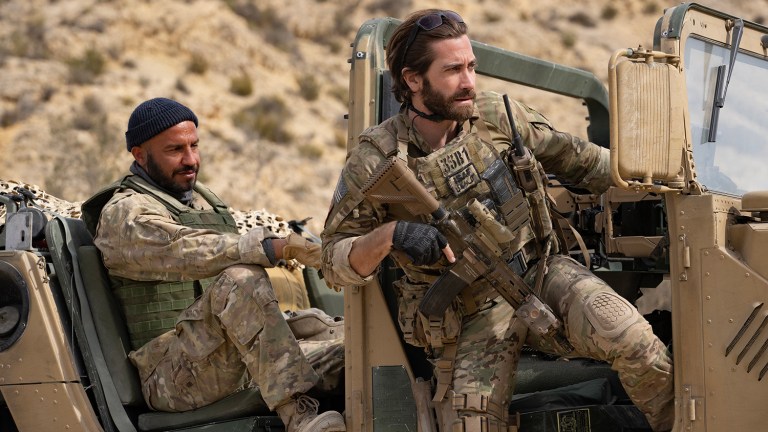The Covenant: Guy Ritchie Demands to Be Taken More Seriously Than Snatch and Aladdin
Guy Ritchie's The Covenant lives up to the title as a director's fascination with hyper-masculinity suddenly wants to do more than just hang out with the guys.

Despite a solid 25 years in the business and a slew of hits to his name, it still feels somewhat premature for Guy Ritchie to be putting his name in the title of his latest film. Officially billed as Guy Ritchie’s The Covenant, ostensibly to avoid confusion with a 2006 sexy witches movie, it’s all a touch too easy to make fun of. Ritchie has never been a director who commands the respect of critics with his bloke-friendly gangster fare proving extremely influential—particularly Lock, Stock and Two Smoking Barrels (1998) and Snatch (2000)—if not necessarily acclaimed. Yet his impact is undeniable, and he’s been a consistently excellent director of genre fare with a specific vision, even as the face of blockbuster cinema has remodelled itself in the franchise era.
Over the past few years, Ritchie ventured into more traditional Hollywood fare, including the unavoidable realm of Disney live-action remakes via 2019’s Aladdin. This time, however, he’s made a war film, a story of the U.S. military’s involvement in Afghanistan, and of promises broken in the name of so-called freedom. It’s the most serious topic Ritchie has ever taken on, and perhaps his most earnest endeavour too. Surprisingly, it works.
Jake Gyllenhaal stars as Sgt. John Kinley in The Covenant, a committed soldier stationed in Afghanistan and tasked with leading a platoon in search of Taliban weapons. After their translator is killed in an attack, he is assigned Ahmed (Dar Salim), an interpreter who pushes against John’s orders but proves to be a crucial asset. After an ambush, Ahmed must keep John safe from Taliban forces, putting himself and his family at risk in the process.
In hindsight, it doesn’t seem all that weird for Ritchie to make a war film. His back catalogue is defined by its fascination with masculinity and its inherent ridiculousness. The more macho someone is in his movies, the more likely they are to be either inept or a total jackass. In his early, Cockney crime films, the characters play at being tough but their most violent indiscretions are tainted with the air of tedium. It seems exhausting trying to be a tough guy in a Ritchie film, and even the ones who are good at it must have their egos punctured as often as possible. Where better to explore that inevitable toxicity than a war film?
Admittedly, The Covenant is less focused on that masculine panic than something like Lock, Stock, and Two Smoking Barrels, but in brief moments that subversion shines through. The banter is here but is typically undercut by the bleakness of these soldiers’ circumstances. We’re introduced to them casually chatting right before a bomb goes off and kills one of their own. When Kinley goes back and forth with a fellow soldier for reconnaissance info, joking about what a cheap date he is, the two men barely crack a smile. When you’re constantly on the verge of being killed, Ritchie-esque quips feel more like coping mechanisms than anything else.
The Covenant does see Ritchie pulling back on some of his more fervent stylistic tics, although he still knows how to shoot an action sequence like the best of them. The flashy montage of Sherlock Holmes’ bare-knuckle fight tactics may have been quickly meme’d but they exemplified the technical prowess of Ritchie at his peak: kinetic movement, a real sense of force with each punch landed, and welcome visual cohesion. In The Covenant, you feel the might of every death, and you see them clearly even when the camera is constantly moving. This is a place where nobody stays still, and neither does Ritchie, although he avoids the dizzying shaky-cam tactics of a Paul Greengrass or burst of Bayhem. You don’t get lost watching a Ritchie fight scene.
Gyllenhaal is the ideal actor for a typical Ritchie film. His best performances see him subverting or outright mocking the cinematic masculine ideal. In Nightcrawler, he shed his handsome exterior to embody the sleazy fury of a fame-hungry sociopath. Brokeback Mountain saw him turn the stoic cowboy stereotype on its head for a tale of forbidden love and the pain of bottling such passions up. Most recently, he gave a surprisingly excellent performance in Michael Bay’s Ambulance, turning what could have been a typical action villain into a bombastic weirdo with trigger fingers and a heavy streak of vanity. But here, he’s deadly serious, and doing good work with those restrictions. Kinley is a by-the-book soldier who is smothered by both the military’s bureaucratic nonsense and the inescapable presence of death. He follows the rules because that’s all he’s supposed to do, and when he decides to go against the grain, his fury at being forced to do so is palpable.
As Ritchie moves more toward American filmmaking and the current demands of high-budget fare, he’s often struggled to steer past the more stifling studio notes of IP-driven cinema. With Aladdin, which is a rare Disney live-action remake that almost justifies its own existence, he felt too reined in by the notoriously controlling company’s requirements. Rather than bring real zeal or some much-needed change to the film, it was clear that Ritchie had basically been told to recreate the cartoon as much as possible. That movie comes to life when he doesn’t have to do that.
While Ritchie can’t avoid all of the trappings of the modern war genre—the soldier’s sad wife and kids at home, the drone shots of a desolate landscape, the score tinged with vaguely Middle Eastern sounding strings—he does find an oft-overlooked angle of this deeply scarring real-life conflict. War films love to chew on the tedium of ineffectual bureaucracy but here, the target is sharper.
Salim’s Ahmed, like tens of thousands of Afghans before him, has agreed to be a translator for “the enemy” because they have been offered Visas in exchange for their services. Having lost his son to the Taliban, Ahmed wants to get his pregnant wife to safety, and the promise made by the Americans is seemingly worth the risk. But he doesn’t get it. Indeed, most of the interpreters were essentially abandoned in the country once the soldiers left, but now they had targets on their backs for what the Taliban deemed to be acts of treachery. There’s no way to heroize this fraught legacy of an already bleak moment in American history.
Still, despite this new level of sophistication, one of Ritchie’s biggest blind spots rears its ugly head in The Covenant. He’s great with tackling masculinity but really only that of white men. Seemingly light-hearted moments often come to a screeching halt thanks to casual racism, as was the case every time Henry Golding’s character appeared onscreen in The Gentlemen (2019). Ritchie brings great humanity to the American soldiers here, but almost every Afghan is just another body to be shot. Ahmed is easily the most interesting character in The Covenant, and Dar Salim is giving a striking performance as a man caught between two impossible binds in the name of saving his own life. Yet even though the second half of the film is his struggle, it’s Gyllenhaal’s character who gets the most complete emotional arc. In that sense, it’s the most American director thing Ritchie’s ever done, which is a real shame.
If The Covenant signals a desire by Ritchie to move into a more serious-minded realm of filmmaking then this is a positive sign that he can pull it off without losing his most interesting qualities. It’s certainly a preferable route for him than what Disney is offering (of course, he is signed onto a live-action remake of Hercules). Perhaps he has earned the right to put his name in the title.
